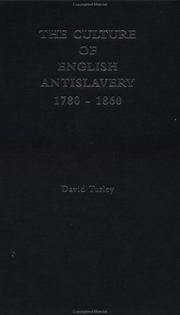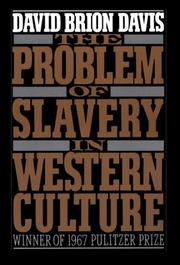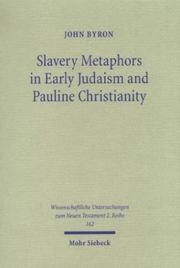| Listing 1 - 10 of 40 | << page >> |
Sort by
|
Book
ISBN: 1400879019 9781400879014 0691624259 9780691624259 069104564X Year: 2015 Publisher: Princeton, NJ
Abstract | Keywords | Export | Availability | Bookmark
 Loading...
Loading...Choose an application
- Reference Manager
- EndNote
- RefWorks (Direct export to RefWorks)
The growing appeal of abolitionism and its increasing success in converting Americans to the antislavery cause, a generation before the Civil War, is clearly revealed in this book on the Methodist Episcopal Church in America. The moral character of the antislavery movement is stressed. Originally published in 1965.The Princeton Legacy Library uses the latest print-on-demand technology to again make available previously out-of-print books from the distinguished backlist of Princeton University Press. These editions preserve the original texts of these important books while presenting them in durable paperback and hardcover editions. The goal of the Princeton Legacy Library is to vastly increase access to the rich scholarly heritage found in the thousands of books published by Princeton University Press since its founding in 1905.
Slavery and the church --- Church and slavery --- Church --- Methodist Episcopal Church.
Book
ISBN: 1611462010 1611462029 9781611462029 9781611462012 Year: 2016 Publisher: Bethlehem
Abstract | Keywords | Export | Availability | Bookmark
 Loading...
Loading...Choose an application
- Reference Manager
- EndNote
- RefWorks (Direct export to RefWorks)
Faith and Slavery considers how in diverse places-the New Hebrides, Scotland, the United States, and East Central Africa-the Presbyterian faith shaped men's and women's interpretations of and interactions with chattel slavery. The chapters highlight how the particular ways Presbyterians framed the Reformed Tradition made slavery an especially problematic and fraught issue for adherents to the faith, and led to a variety of reactions to slavery-ranging from abolitionism, to indifference, to support.
Slavery and the church --- Presbyterian --- Presbyterian Church. --- Doctrines. --- Church and slavery --- Church
Book
ISBN: 9780252096129 0252096126 9780252038266 1306980933 9781306980937 0252038266 Year: 2014 Publisher: Urbana
Abstract | Keywords | Export | Availability | Bookmark
 Loading...
Loading...Choose an application
- Reference Manager
- EndNote
- RefWorks (Direct export to RefWorks)
This collection of fifteen insightful essays examines the complexity and diversity of Quaker antislavery attitudes across three centuries, from 1658 to 1890. Contributors from a range of disciplines, nations, and faith backgrounds show how Quakers often disagreed with one another and the larger antislavery movement about slavery itself and the best path to emancipation. Far from having monolithic beliefs, Quakers embraced such diverse approaches as benevolent slaveholding, both gradual and comprehensive abolition, and consumer boycotts of slave-produced products. These evolving and uneven conceptions of slavery and emancipation were similar to the varied views Quakers had on racial integration. Offering a nuanced interpretation of these controversial topics--one that often diverges from existing scholarship--contributors discuss how Quakers attempted to live out their faith's antislavery imperative. Essays address Quaker missions in Barbados; the interplay between African-American and Quaker communities in Pennsylvania and New Jersey; transatlantic correspondence between a colonialist Quaker and a freed slave who "returned-to-Africa" as a Liberian colonist; and the impact of Quaker-authored frontier literature. Not surprisingly, this complicated and evolving antislavery sensibility left behind an equally complicated legacy. Focusing on Great Britain, France, and the United States, contributors show how Quaker antislavery actions and writings influenced revolutions and antislavery in those countries. Yet the Quaker contribution is also a hidden one because it so rarely receives substantive attention in modern classrooms and scholarship. This volume faithfully seeks to correct that oversight, offering accessible and provocative new insights on this key chapter of religious, political, and cultural history. Contributors include Dee E. Andrews, Kristen Block, Brycchan Carey, Christopher Densmore, Andrew Diemer, J. William Frost, Thomas D. Hamm, Nancy A. Hewitt, Maurice Jackson, Anna Vaughan Kett, Emma Jones Lapsansky-Werner, Gary B. Nash, Geoffrey Plank, Ellen M. Ross, Marie-Jeanne Rossignol, James Emmett Ryan, and James Walvin.
Antislavery movements --- Quaker abolitionists --- Slavery and the church --- Abolitionists --- Abolitionism --- Anti-slavery movements --- Slavery --- Human rights movements --- Church and slavery --- Church --- History. --- Society of Friends
Book
ISBN: 9780190073268 0190073268 9780190073282 Year: 2020 Publisher: New York: Oxford university press,
Abstract | Keywords | Export | Availability | Bookmark
 Loading...
Loading...Choose an application
- Reference Manager
- EndNote
- RefWorks (Direct export to RefWorks)
"This is the story of how the church sought to establish norms for slave ownership on the part of ecclesiastical institutions and personnel and for others' behavior towards such slaves. The story begins in the New Testament era, when the earliest Christian norms were established and continues through the Late Roman Empire, the Germanic kingdoms, and the Carolingian empire, to the thirteenth-century establishment of a body of ecclesiastical regulations (canon law) that would persist into the twentieth century. Along with an analysis of the various policies and statutes, chronicles, letters, and other documents from each of the various historical periods provide insight into the situations of these unfree ecclesiastical dependents. The book stops in the thirteenth century, which was a time of great changes, not only in the history of the legal profession, but also in the history of slavery as Europeans began to reach out into the Atlantic. Although this book is a serious scholarly monograph about the history of church law, it has been written in such a way that no specialist knowledge is required of the reader, whether a scholar in another field or a general reader interested in church history or the history of slavery. Historical background is provided and there is a short Latin lexicon"--
Slavery and the church --- Slavery --- History --- Religious aspects --- Church and slavery --- Church --- 326 "00/04" --- 326 "04/14" --- 326 "04/14" Slavernij--(algemeen)--Middeleeuwen --- Slavernij--(algemeen)--Middeleeuwen --- 326 "00/04" Slavernij--(algemeen)--?"00/04" --- Slavernij--(algemeen)--?"00/04" --- Eglise --- Esclavage

ISBN: 0203285751 1280326166 113497745X 0203169336 9780203285756 9780203169339 9781134977444 1134977441 0415020085 9780415020084 9781134977406 9781134977451 9781138009042 1138009040 Year: 1991 Publisher: London New York Routledge
Abstract | Keywords | Export | Availability | Bookmark
 Loading...
Loading...Choose an application
- Reference Manager
- EndNote
- RefWorks (Direct export to RefWorks)
This book provides a fresh overall account of organised antislavery by focusing on the active minority of abolutionists throughout the country. The analysis of their culture of reform demonstrates the way in which alliances of diverse religious groups roused public opinion and influenced political leaders. The resulting definition of the distinctive `reform mentality' links antislavery to other efforts at moral and social improvement and highlights its contradictory relations to the social effects of industrialization and the growth of liberalism.
Antislavery movements --- Abolitionists --- Social reformers --- Slavery and the church --- Church and slavery --- Church --- Reformers --- History. --- Great Britain --- History --- Slavery - Great Britain - Anti-slavery movements. --- Abolitionists - Great Britain - History. --- Social reformers - Great Britain - History. --- Slavery and the church - Great Britain - History.
Book
ISBN: 9780300182279 0300182279 9780300180770 0300180772 1283736276 9781283736275 Year: 2012 Publisher: New Haven [Conn.] : Yale University Press,
Abstract | Keywords | Export | Availability | Bookmark
 Loading...
Loading...Choose an application
- Reference Manager
- EndNote
- RefWorks (Direct export to RefWorks)
In the first book to investigate in detail the origins of antislavery thought and rhetoric within the Society of Friends, Brycchan Carey shows how the Quakers turned against slavery in the first half of the eighteenth century and became the first organization to take a stand against the slave trade. Through meticulous examination of the earliest writings of the Friends, including journals and letters, Carey reveals the society's gradual transition from expressing doubt about slavery to adamant opposition. He shows that while progression toward this stance was ongoing, it was slow and uneven and that it was vigorous internal debate and discussion that ultimately led to a call for abolition. His book will be a major contribution to the history of the rhetoric of antislavery and the development of antislavery thought as explicated in early Quaker writing.
Slavery and the church --- Quaker abolitionists --- Society of Friends --- Antislavery movements --- Abolitionists --- Church and slavery --- Church --- Abolitionism --- Anti-slavery movements --- Slavery --- Human rights movements --- Quakerism --- Religious Society of Friends --- Christian sects --- Quakers --- History

ISBN: 0195056396 0199799059 9786610605330 1280605332 Year: 1966 Publisher: New York Oxford University Press
Abstract | Keywords | Export | Availability | Bookmark
 Loading...
Loading...Choose an application
- Reference Manager
- EndNote
- RefWorks (Direct export to RefWorks)
Slavery --- Slavery and the Church --- Church and slavery --- Church --- Abolition of slavery --- Antislavery --- Enslavement --- Mui tsai --- Ownership of slaves --- Servitude --- Slave keeping --- Slave system --- Slaveholding --- Thralldom --- Crimes against humanity --- Serfdom --- Slaveholders --- Slaves --- Enslaved persons

ISBN: 2865373878 9782865373871 Year: 1993 Publisher: Paris: Karthala,
Abstract | Keywords | Export | Availability | Bookmark
 Loading...
Loading...Choose an application
- Reference Manager
- EndNote
- RefWorks (Direct export to RefWorks)
Slavery and the church --- Blacks --- Esclavage et l'Eglise --- Noirs --- History --- Segregation --- Histoire --- Ségrégation --- Esclavage --- --Églises --- --XVe-XIXe s., --- 326.1 --- -Church and slavery --- Church --- Slavenhandel --- 326.1 Slavenhandel --- -Slavenhandel --- -326.1 Slavenhandel --- Church and slavery --- Ségrégation --- Black people --- History. --- Églises --- XVe-XIXe s., 1401-1900 --- Slavery and the church - History --- ESCLAVAGE --- ESCLAVAGE ET L'EGLISE --- EGLISE CATHOLIQUE --- NOIRS --- CONDITIONS SOCIALES --- HISTOIRE SOCIALE --- HISTOIRE --- 15E-19E SIECLES --- 13E-20E SIECLES --- 15E-20E SIECLES --- 1500 --- -CONDITIONS SOCIALES
Book

ISBN: 2884570004 Year: 1997 Publisher: Genève Musée d'ethnographie
Abstract | Keywords | Export | Availability | Bookmark
 Loading...
Loading...Choose an application
- Reference Manager
- EndNote
- RefWorks (Direct export to RefWorks)
Sociology of minorities --- slavery --- Exhibitions --- Art, African --- Slavery and the church --- Slavery --- Slave-trade --- Abolition of slavery --- Antislavery --- Enslavement --- Mui tsai --- Ownership of slaves --- Servitude --- Slave keeping --- Slave system --- Slaveholding --- Thralldom --- Crimes against humanity --- Serfdom --- Slaveholders --- Slaves --- Church and slavery --- Church --- History&delete& --- History --- Enslaved persons

ISBN: 3161480791 9783161480799 Year: 2003 Volume: 162 Publisher: Tübingen: Mohr Siebeck,
Abstract | Keywords | Export | Availability | Bookmark
 Loading...
Loading...Choose an application
- Reference Manager
- EndNote
- RefWorks (Direct export to RefWorks)
Slavery and Judaism. --- Slavery in the Bible. --- Slavery and the Church. --- Slavery --- 326 --- 227.08 --- Slavernij--(algemeen) --- Paulinische theologie --- 227.08 Paulinische theologie --- 326 Slavernij--(algemeen) --- Slavery and Judaism --- Slavery and the Church --- Slavery in the Bible --- Church and slavery --- Church --- Judaism and slavery --- Judaism --- Onesimus, --- Bible. --- Philemon (Book of the New Testament) --- Slavery - Rome.
| Listing 1 - 10 of 40 | << page >> |
Sort by
|

 Search
Search Feedback
Feedback About UniCat
About UniCat  Help
Help News
News